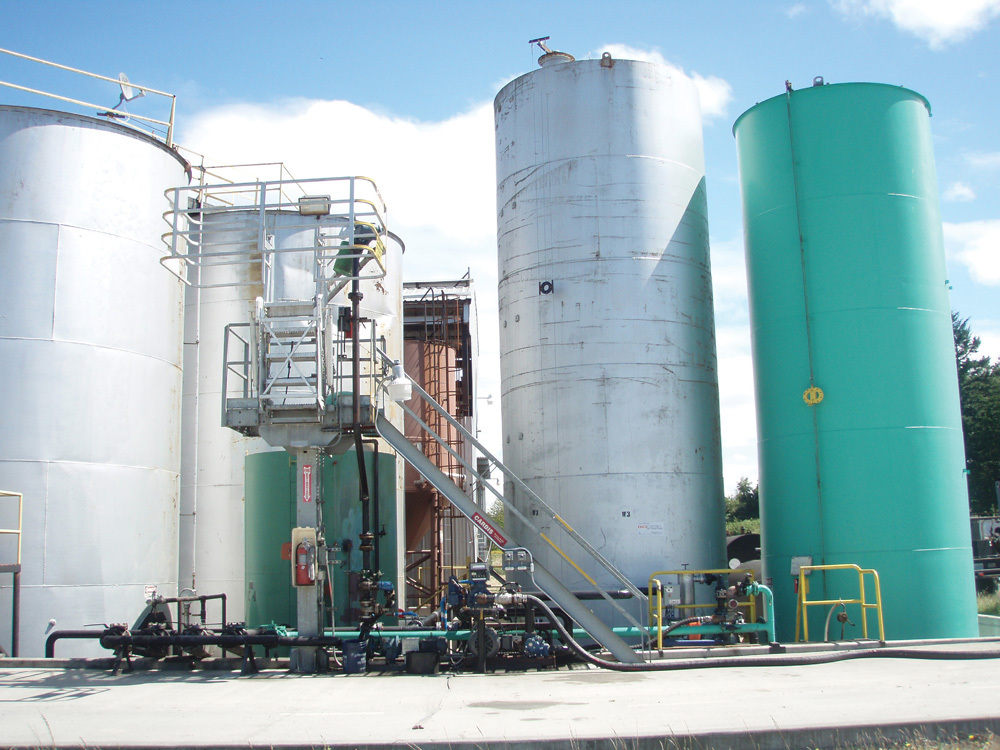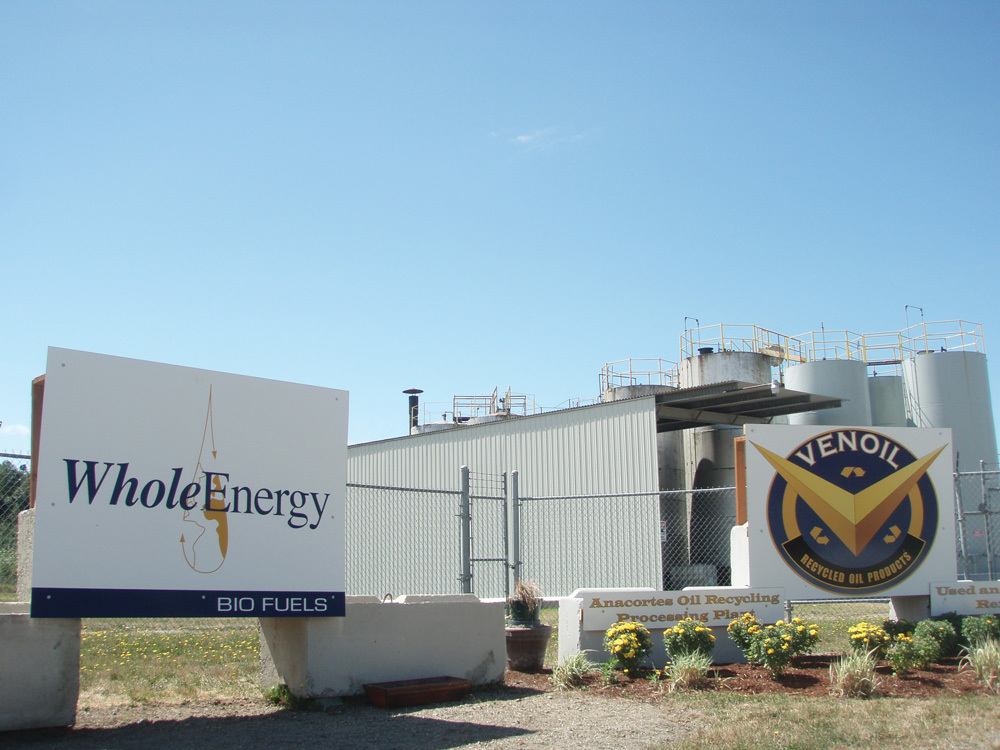A Collaborative Approach



PHOTO: WHOLE ENERGY FUELS CORP.
July 18, 2012
BY Erin Krueger
The word “infrastructure” often brings to mind huge industrial-scale endeavors. Strong infrastructure development is also important, however, for smaller-scale biodiesel operations that aim to serve their local and regional communities. A new project underway by three companies in Portland focuses on the co-location of grease recycling, biodiesel production and distribution operations. Once complete, the collaborative initiative will allow all three entities to better and more efficiently serve their communities.
While many in the biodiesel industry aim to supply fuel into the compliance marketplace, oil recycler Oregon Oils Inc., fuel producer Beaver Biodiesel LLC and distribution company Whole Energy Fuels Corp. are primarily working to efficiently supply fuel to meet the discretionary blending market in the Portland metro area.
Whole Energy President Atul Deshmane says the Portland marketplace offers a strong demand for discretionary biodiesel blending. “Whole Energy has always been about a discretionary market,” Deshmane says, noting that his company has developed distribution in several locations along the West Coast. “Almost all of our customers buy biodiesel because they really want to buy it—they really like the product.” In fact, Deshmane estimates that 90 percent of the biodiesel his company delivers to market fills discretionary blending demand.
The new location in Portland will also offer powerful cost savings, largely through reduced transportation costs. Daniel Shafer, principal manager of Beaver Biodiesel, estimates that moving his company’s biodiesel plant to the new location could reduce transportation costs associated with feedstock and fuel delivery and that co-locating with Oregon Oils will help manage risks associated with feedstock supply disruption. Oregon Oils is also relocating its operations as part of the project. Company President David Burns says the move will also help his company better meet the needs of its clients, as oil collection operations can be completed more quickly and efficiently.
Project Development
Oregon Oils and Beaver Biodiesel have long histories of working in the Portland metro area. Oregon Oils has been in business 20 years and is the largest waste cooking oil and trap grease recycler in the metro area, according to Burns. The company initiated the move to its new location in December. “We are in the middle stages of getting set up,” he says.
Beaver Biodiesel is also in the process of relocating its plant. The company is moving its production capacity approximately 80 miles north, from Albany, Ore., to an industrial district near downtown Portland. The 1.2 MMgy plant has been in operation for several years, and has historically produced fuel using mostly recycled cooking oil. Shafer notes, however, that his company is a sponsor of a Biomass Crop Assistance Program camelina project area, and expects to produce a portion of its biodiesel using camelina oil in the future.
Shafer says that he anticipates the move will allow his company to reduce its transportation costs by up to 20 cents per gallon. That savings takes into account transportation costs for both feedstock delivery and fuel shipment. “We expect to be [more] price competitive,” he says.
Advertisement
Work to move the facility is already underway. “We intend to move all of our production to Portland, and then expand operations over time,” Shafer says. “We expect to have our [original 1.2 MMgy] capacity reinstalled and operational this fall.” The plant will also register with the U.S. EPA under RFS2. That process takes approximately six months.
While Shafer stresses that his company’s intent is to have the plant reassembled and operational this fall, biodiesel production will not necessarily begin immediately. “We need to do some careful planning in order to decide when biodiesel production should resume here,” he says. The wholesale price of diesel recently dropped, weakening the local market demand for biodiesel. In addition, unsettlement in the renewable identification number (RIN) market with regard to a lack of demand for RINs from small producers due to isolated incidents of fraud is also making it more difficult for small producers to compete economically. The market is going to have to strengthen and RINs are going to have to become a firmer proposition to the small producer for it to make economic sense to restart our production, Shafer says. The potential delay in restarting the Beaver Biodiesel plant will not, however, impact the biofuel hub’s grease recycling and biodiesel distribution operations.
Whole Energy, alternatively, is not relocating to the new location near downtown. Rather, it is establishing new operations within the market. “We are just getting the Portland location set up,” Deshmane says. “We are going to pursue proportional blending there.” The location will also feature 20,000 gallons of indoor, heated storage capacity. According to Deshmane, the 20,000-gallon tank is just a first step, and it is likely storage capacity will increase. He says storage and distribution aspects of the project were to be operational this summer.
It is also possible that distillation equipment may be added to the new Portland site eventually. “We think that the Portland market would want a distilled product,” he says, adding that if this decision is made, Whole Energy would co-invest. Shafer notes Beaver Biodiesel would also be involved.
Effective Cooperation
“The importance of this project is that we genuinely reduce the cost of production and distribution of biodiesel,” Shafer says. “We will be able to bring a cost-effective, premium quality product to market and be competitive. We are vertically integrated in a way that allows us to bring a product to market that customers want at a price that works.”
Deshmane says he’s been interested in establishing this type of cooperative project because he believes in the concept that small businesses can achieve significant benefits through cooperation. “I think the main benefit is that businesses working together towards a common cause can grow the market and provide highly efficient service,” he says. “I think businessmen, by nature, are fiercely independent, but the world of energy is so big and [big agriculture and energy companies] are too easily able to dominate. Small businesses have to band together if we expect to survive in energy.”
While it’s possible many companies would prefer to have ownership in all three vertically integrated operations, Deshmane points out that there are advantages to simply forming cooperative working arrangements with other companies absent ownership. He stresses that capital investments are far less. “It’s easier for a small company to play a role and grow into being part of a bigger overall enterprise,” he says. There are also benefits to collaborating with companies that have long-term experience and in-depth knowledge of their industry and market.
Advertisement
The location of the initiative is one of several factors that Deshmane, Shafer and Burns name as important to this project’s success. Portland is a good home for this type of co-located project due to its strong discretionary blending market, Deshmane says. Portland also offers strong potential for co-located operations due to sufficient feedstock supplies and a lack of competition from other community-scale producers.
The specific location within Portland is also important. Oregon consumes about 40 million gallons of B100 per year, Shafer says. Much of that fuel is used to meet the state’s B5 mandate. According to Shafer, approximately 60 percent the petroleum fuel that enters the state flows directly into major fuel terminals in Portland. “This facility is about three blocks away from the highway where 60 percent of the fuel is distributed throughout the state via truck,” he says. “Whole Energy is wise to develop this project into a major distribution terminal, and this location for distribution is the real powerhouse aspect of this facility. We have rail on-site, so there is the opportunity to expand operations into a major biodiesel manufacturing and distribution hub.”
Deshmane adds that it is imperative to find partners who really want to collaborate for a project like this to be successful. “If there is not that initial desire to work together, then you can’t go anywhere,” he says. “We have a really good collaborative effort. We are all in this together. It’s hard to do that—to find people who have the right mentality.”
Beyond the desire to collaborate, he also notes it’s crucial that each entity fully trusts the others. According to Deshmane, Whole Energy will consider replicating this type of vertically integrated project in other metropolitan areas, as long as it’s a good fit with the local market.
Additional Infrastructure
The Portland project is far from the only biodiesel infrastructure development initiative that Whole Energy is spearheading. The company also owns and operates biodiesel distribution in several other locations spanning from California to Washington.
Whole Energy’s location in Anacortes, Wash., has 120,000 gallons of heated storage capacity. The site also features proportional blending equipment and an on-site lab. While rail access is not available there, Deshmane says rail transloading is nearby. The company’s site in Tacoma, Wash., includes both rail and truck access and up to 120,000 gallons of storage. A location in Richmond, Calif., also has rail and truck access and the opportunity for Whole Energy to lease up to 250,000 gallons of storage. Whole Energy has also established distribution infrastructure in the Los Angeles area that includes rail and truck access and 30,000 gallons of storage.
Deshmane says the California Energy Commission recently selected Whole Energy to receive $125,274 in grant funding to install proportional blending equipment at the Richmond facility. The company has already secured permits for the project and expects the upgrade to be complete by end of year. We would have completed the upgrade eventually, Deshmane says, noting that the grant award is enabling Whole Energy to upgrade its capabilities sooner than would otherwise be possible. The new blending equipment will help Whole Energy better serve its strong customer base in the Richmond area. “Business in Richmond is going really well,” he says. “I can barely keep up.” The company is also eying the possibility of upgrading its other existing facilities. “We would like to have the proportional blending and microfiltration at each of our locations,” Deshmane says.
The company is also expanding its operations to include glycerin refining, and is putting together a glycerin refining plant at the Mount Vernon Terminal Railway in Washington. According to Deshmane, his company wanted to find a way to be involved in production without competing with its biodiesel suppliers. By starting a glycerin refining operation, he says Whole Energy is actually able to help its biodiesel suppliers increase the value of their glycerin coproduct. “I want to expand what we are doing with glycerin into California.”
Author: Erin Voegele
Associate Editor, Biodiesel Magazine
(701) 540-6986
evoegele@bbiinternational.com
Upcoming Events





